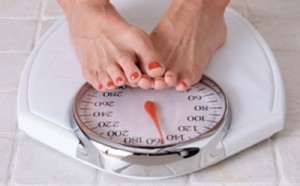 Have you been getting on your scale while stuck at home? Or are you afraid of what it might say?
Have you been getting on your scale while stuck at home? Or are you afraid of what it might say?
When working towards a fat loss goal the question arises of how to best utilize the scale.
Do you step on everyday, meticulously tracking the ups and downs? Do you jump on it once a week, keeping your mind off the number most days? Or do you skip the scale altogether and simply navigate your transformation using the markers of how you organically look and feel?
Here’s a closer look at each method:
The Everyday Method: There’s a large school of the thought that says in order to lose the most weight in the shortest amount of time you must get on the scale everyday.
Weight yourself at the same time, preferably first thing in the morning, wearing as little as possible. Record the daily number and react accordingly. If your weight has gone up then make modifications to your diet (eat less) and to your workouts (exercise harder). If your weight has lowered then keep on doing what you’re doing because it’s working.
Everyday Method Pros: There is research that backs this as a reliable method. In a Journal of Obesity Study, published in 2015, researchers at Cornell University found that participants who tracked their weight daily for two years were more successful in both losing weight and keeping it off than participants skipped daily weigh-ins.
Everyday Method Cons: Facing the scale daily can be discouraging for some, due to normal fluctuation in water retention, which can take a toll psychologically. Those who get discouraged enough may give up on their transformation quest entirely. Others may get obsessive about their weight causing an unhealthy compulsion to develop.
The Never Method: In opposition to the Everyday Method is the Never Method – as in, NEVER get on the scale. This method requires that you rely on natural instincts rather than numbers and that you pay close, intuitive attention to how you feel and how your clothes fit.
Never Method Pros: No more feeling terrible when the number on your scale tells you that you’ve gained another 5 pounds! No more obsessing over a number! Your self esteem will be untouched and you’ll experience a form of freedom.
Never Method Cons: If you don’t keep close tabs on how you feel and how your clothes fit then this method easily results in pounds adding up gradually over time. It is very difficult to notice weight gain that takes place at a very gradual rate without the use of a scale.
The Once Per Week Method: A once per week weigh-in is the most popular method. Getting on the scale on the same day, at the same time, each week is a compromise between daily and never. It’s the compass method: frequent enough to notice when you begin to drift off track, but infrequent enough to not intrude on your life in a negative way.
Once Per Week Method Pros: You only have to endure the scale once per week, which is a blessing if the scale makes you feel demoralized. It’s frequent enough to bring gradual weight gain to your attention before it gets too far out of hand.
Once Per Week Method Cons: Getting on the scale once every seven days does allow a handful of pounds to add up before you notice, which simply won’t happen with daily weigh-ins. Weight gained in a single week can take more than another week to lose.
The Best Method: The truth is that there’s no universal right way to monitor your fat loss progress in order to stay on track. The method that you choose should be the one that positively supports you towards your goals. Since you know yourself better than anyone, think long and hard about the method that is best for you.
If you hate the scale but know that daily weigh-ins are the best way to keep you on track then bite the bullet and do it.
3 Steps to Weigh Yourself Right
To ensure that you’re getting an accurate read when you jump on that scale keep the following steps in mind:
Time: Always weigh yourself at the same time of day, preferably first thing in the morning after going pee.
Clothing: Wear the same type and amount of clothing, or (if in the privacy of your own home) weigh without clothing.
Journal: Keep a log of your weight along with the date to create a history of data to assist you towards your fitness goal.
Remember, I am here to support and propel you in your fat loss transformation. If you aren’t currently one of my amazing clients then now is the time to call or email to get yourself on the right track. Let’s do this together!

